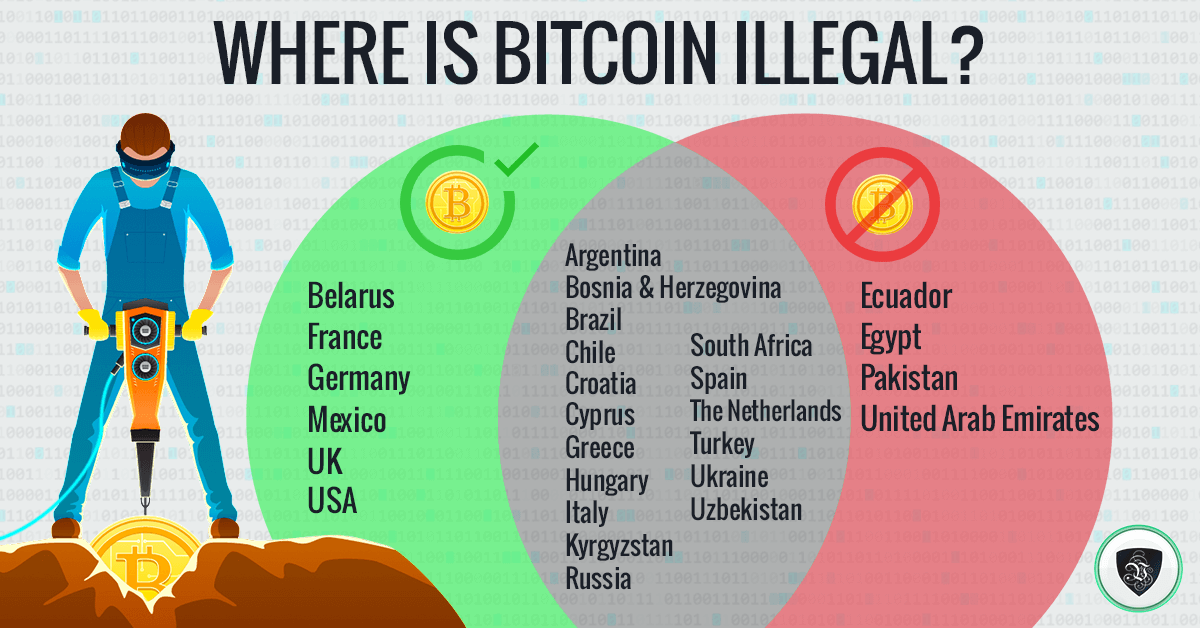Bitcoin is banned in which countries
Contents:
These Countries Have the Strongest Bitcoin Restrictions
These are the five most notable countries where cryptocurrencies have been restricted or made completely illegal:. China was once home to many cryptocurrency exchanges. Being the most populated country in the world, these were large. However, cryptocurrencies were banned in Since then, Chinese authorities have introduced blockchain technology into their financial institutions for better transparency and the tracking of transactions.
Latest Articles
There have been rumors that China plans to ban mining and plans to launch a national cryptocurrency. Some believe this could lead to China lifting its ban on cryptocurrencies soon. Bolivia is reluctant to allow cryptocurrencies because of increased criminal activities within the country.
Recently, a hidden pyramid scheme involving cryptocurrency investments was also uncovered and condemned. This prompted a statement by the Central Bank of Bolivia reiterating that the use of cryptocurrencies is prohibited in the country.
Countries With Strongest Bitcoin Restrictions - TheStreet
It is illegal to operate cryptocurrencies in Colombia, even though it is one of the important FinTech economies in Latin America. Many companies risk losing access to financial services if they unlawfully handle cryptocurrencies. However, many new startups focus on blockchain and cryptocurrency and are facing an uncertain future. There was one recent attempt to regulate the industry in , but the proposal was rejected by the Colombian Senate.
Up until now, it is partly legal to trade in cryptocurrencies in Russia, but not to buy goods and services. Russia is set to pass a bill on digital assets soon and plans to pass a ban on issuing and selling cryptocurrencies. According to a report in Forbes , the authorities in Russia worry about the financial instability digital currencies can cause. They say that consumer protection is vital, as is the need to prevent money laundering. A while back, the Iranian Central Bank banned the use of cryptocurrencies in transactions. Their biggest fear is money laundering and terrorism, but it was also implemented as a measure to control the demise of their rapidly devaluating currency.
Share Tweet.

Follow us on Twitter or join our Telegram. If you are looking to buy, sell, or spend Bitcoin, you should check if it is legal in your country.
Retrieved 15 March You can help by adding to it. A report by Investopedia says the digital currency has also made its way to the U. Bitcoin is under certain tax regulations in the U. Equity Mutual fund. The Reserve Bank Of Zimbabwe is sceptical about bitcoin and has not officially permitted its use. AMBD however, advised the public not to be easily enticed by any investment or financial activity advertisements, and to conduct due diligence and understand the financial products properly before participating.
In fact, there are many countries with different cryptocurrency regulations. Some of them even single out Bitcoin, allowing it to be used as money, pay taxes, purchase goods, or trade it like a commodity. In other countries, even the mere possession of Bitcoin can get you to prison. Others have not even bothered to regulate it yet, leaving Bitcoin and other cryptos in legal limbo. Bitcoin and cryptocurrencies are generally welcomed in most parts of the world. Nevertheless, some countries have actually banned them or their use. Whether bans were imposed due to Bitcoins decentralized nature, the threat to their current financial system or just because proper regulations are yet to be approved, there are at least nine countries as of March which decided to do so.
- Legality of bitcoin by country or territory;
- bitcoin trading system reviews.
- jadwal film bioskop hari ini di btc;
These are:. In addition to the countries where BTC is banned, there are also countries where Bitcoin is somewhat restricted and cannot be traded or used for payment.
Morocco-Banned Bitcoin Reaches $50K
In such states, banks and other financial service providers are prohibited from dealing with cryptocurrency exchanges and companies, and in more extreme cases the countries have even banned crypto exchanges etc China. Note that despite the bans and restrictions, these laws have not eradicated Bitcoin or other cryptocurrency trades and their usage. Due to the nature of decentralized cryptocurrencies, it is simply impossible to ban them.
Many individuals in those countries still make use of sites like Local Bitcoins , Paxful or Bisq to trade it with others, as indicated by the trading volumes on these platforms. This just serves to prove that no government holds the power of truly ban Bitcoin unless they prohibit the usage of the internet for the entire nation. On a positive note, research shows there are at least states where Bitcoin and cryptocurrencies are recognized by law and are legal. For instance, major countries like the United States and Canada hold a generally crypto-friendly attitude towards cryptocurrencies while also trying to enforce anti-money laundering laws and prevent fraud.
Meanwhile, in the European Union, the member states are not allowed to launch their own cryptocurrency, but crypto exchanges are encouraged to be legalized and comply with the regulations. In such cases, the usage of BTC is legal in the sense that you can own it, but there are no clear rules or legal protection concerning its status. These countries are either already creating a legal framework for Bitcoin and cryptocurrencies, or have taken a wait-and-see approach.
Fears of widespread cryptocurrency crackdowns have had a long-standing effect on Bitcoin. Because of that, many people are wary of the trustless system and rely on traditional systems instead. Regardless, a growing number of governments choose to embrace digital innovation and play a role in the industry.
- bitcoin sitesi hacklendi?
- how to cash out bitcoins without paying taxes.
- Other countries, besides Nigeria, where authorities won’t let you use cryptocurrencies!